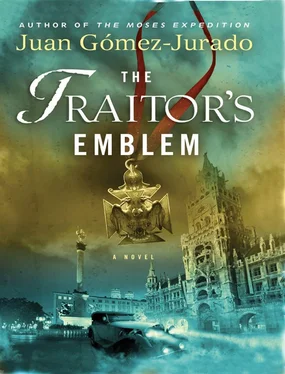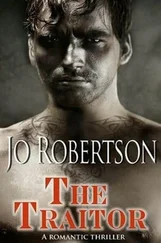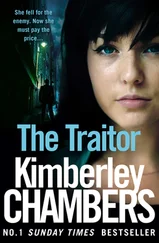Juan Gomez-Jurado - The Traitor's emblem
Здесь есть возможность читать онлайн «Juan Gomez-Jurado - The Traitor's emblem» весь текст электронной книги совершенно бесплатно (целиком полную версию без сокращений). В некоторых случаях можно слушать аудио, скачать через торрент в формате fb2 и присутствует краткое содержание. Жанр: Триллер, на английском языке. Описание произведения, (предисловие) а так же отзывы посетителей доступны на портале библиотеки ЛибКат.
- Название:The Traitor's emblem
- Автор:
- Жанр:
- Год:неизвестен
- ISBN:нет данных
- Рейтинг книги:4 / 5. Голосов: 1
-
Избранное:Добавить в избранное
- Отзывы:
-
Ваша оценка:
- 80
- 1
- 2
- 3
- 4
- 5
The Traitor's emblem: краткое содержание, описание и аннотация
Предлагаем к чтению аннотацию, описание, краткое содержание или предисловие (зависит от того, что написал сам автор книги «The Traitor's emblem»). Если вы не нашли необходимую информацию о книге — напишите в комментариях, мы постараемся отыскать её.
The Traitor's emblem — читать онлайн бесплатно полную книгу (весь текст) целиком
Ниже представлен текст книги, разбитый по страницам. Система сохранения места последней прочитанной страницы, позволяет с удобством читать онлайн бесплатно книгу «The Traitor's emblem», без необходимости каждый раз заново искать на чём Вы остановились. Поставьте закладку, и сможете в любой момент перейти на страницу, на которой закончили чтение.
Интервал:
Закладка:
“You won.”
“They outnumbered us three to one, but they didn’t know how to fight like an army. More than three thousand fell, and we took all their livestock and weapons. Then…”
The ex-marine lit another cigarette from the stub of the previous one. By the light of the flashlight, his face had lost all expression.
“Trotha ordered you to advance,” said Paul, encouraging him to continue.
“I’m sure you’ve been told this story, but no one who wasn’t there knows what it was really like. We pushed them into the desert. No water, no food. We told them not to come back. We poisoned every well in a radius of hundreds of kilometers, and gave them no warning. The ones who’d hidden, or who’d turned around to fetch water, they were the first warning they got. The others… more than twenty-five thousand, mainly women, children, and old people, made their way into the Omaheke. I don’t want to imagine what became of them.”
“They died, Clovis. No one crosses the Omaheke without water. The only people who survived were a few Herero tribes to the north.”
“We were given leave. Your father and I wanted to get as far away from Windhoek as possible. We stole horses and headed south. I don’t remember the exact route we took, because the first few days we were so drunk that we barely knew our own names. I remember that we passed through Kolmanskop and that a telegram from Trotha was waiting for your father there, saying his leave was over and ordering him to return to Windhoek. Your father tore the telegram up and said he would never return. It had all affected him too deeply.”
“It really did affect him?” said Paul. Clovis could hear the anxiety in his voice and knew he’d found a chink in his opponent’s armor.
“It did, both of us. We carried on getting drunk and riding along, trying to get away from all the horror. We had no idea where we were heading. One morning we reached an isolated farm in the Orange River basin. A family of German colonists lived there, and the devil take me if the father wasn’t the stupidest bastard I’d ever met. There was a stream on their property, and the girls kept complaining that it was full of little pebbles and that when they went to bathe, it hurt their feet. The father had taken those little pebbles out one by one and piled them up round the back of the house, ‘to make a pebbled path,’ he said. Except that they weren’t pebbles.”
“They were diamonds,” said Paul, who, after years of working in the mines, knew that this mistake had happened more than once. Before they are cut and polished, certain kinds of diamond look so coarse that people often confuse them with translucent stones.
“There were some as fat as pigeons’ eggs, son. Others were small and white, and there was even a pink one this big,” he said, holding his fist up to the beam of light. “In those days you could find them in the Orange quite easily, though you ran the risk of government inspectors shooting you if you were caught prowling too close to the site, and there was never any shortage of dead bodies drying out in the sun at crossroads, under the sign DIAMOND THIEF. Well, there were lots of diamonds in the Orange, but I never saw as many in one place as we did on that farm. Never.”
“What did the man say when he found out?”
“Like I said, he was stupid. All he was interested in was his Bible and his crops, and he never let any of his family go down to the city. They didn’t have any visitors, either, as they lived in the middle of nowhere. Which was just as well, because anyone with half a brain would have known straightaway what those stones were. Your father saw the pile of diamonds while they were showing us around the property and he elbowed me in the ribs-just in time, because I was about to say something stupid, hang me if that’s not the truth. The family took us in without asking any questions. Your father was in a foul mood at dinner. He said he wanted to go to sleep, that he was tired; but when the farmer and his wife offered us their room, your father insisted on sleeping in the living room under some blankets.”
“So you could get up in the middle of the night.”
“Which is precisely what we did. There was a trunk next to the fireplace containing the family’s trinkets. We tipped them out onto the floor, careful not to make a sound. Then went round the back and put the stones in the trunk. Believe me, though the trunk was big, the stones still filled three quarters of it. We put a blanket on top of them and then lifted the trunk up onto the small covered wagon the father used for getting supplies. It would all have gone perfectly if it hadn’t been for the damned dog that slept outside. As we hitched our own horses to the wagon and moved off, we ran over its tail. How that damned animal howled! The farmer was up, shotgun in hand. Though he may have been stupid, he wasn’t completely daft, and our wonderfully inventive explanations did no good at all, because he had guessed what we were up to. Your father had to draw that pistol, the same one you’re pointing at me, and shoot off his head.”
“You’re lying,” said Paul. The beam of light was shaking slightly.
“No, son, may a lightning bolt strike me down this minute if I’m not telling you the truth. He killed the man, he killed him good, and I had to gee up the horses because the mother and the two daughters came out onto the porch and started screaming. We hadn’t gone ten miles when your father told me to stop and ordered me to get out of the cart. I told him he was crazy, and I don’t think I was wrong. All that violence and alcohol had made him a shadow of his former self. Killing the farmer was the final straw. It didn’t matter: he had his gun and I’d lost mine one drunken night, so to hell with it, I said, and I got off.”
“What would you have done if you’d had a gun, Clovis?”
“I’d have shot him,” replied the ex-marine, without a second thought. Clovis had an idea about how he could turn the situation to his advantage.
I just need to lead him to the right place.
“So, what happened?” asked Paul. His voice was less confident now.
“I had no idea what to do, so I went on along the track that led back to the town. Your father had cleared off in the early hours of the morning and it was past noon when he returned, except now he didn’t have the wagon, only our horses. He told me he’d buried the trunk in a place only he knew, and that we’d be back to collect it when things had calmed down.”
“He didn’t trust you.”
“Of course he didn’t. And he was right. We left the road, as we were afraid the wife and children of the dead colonist might put out the alert. We headed north, sleeping out in the open, which wasn’t comfortable, especially as your father talked in his sleep and shouted a great deal. He couldn’t get that farmer out of his head. And so it went on till we arrived back in Swakopmund and learned that we were both wanted for desertion, and because your father had lost command of his boat. If the business with the diamonds hadn’t got in the way, your father would doubtless have given himself up, but we were scared that they’d link us to what had happened in the Orange basin, so we remained on the run. We escaped the military police by the skin of our teeth by stowing away on a boat headed for Germany. One way or another, we managed to get back in one piece.”
“Was that when you approached the baron?”
“Hans was obsessed with going back to the Orange for the trunk, and so was I. We spent a few days at the baron’s mansion, in hiding. Your father told him everything, and the baron went crazy… just like your father had, just like everyone did. He wanted to know the precise location, but Hans refused to tell. The baron was bankrupt and didn’t have the money needed to finance a trip back to find the trunk, so Hans signed some papers to transfer the house in which you and your mother lived, together with a small business the two of them owned. Your father assumed the baron would sell them to raise funds for recovering the trunk. Neither of us could do it, as by then we were wanted men in Germany too.”
Читать дальшеИнтервал:
Закладка:
Похожие книги на «The Traitor's emblem»
Представляем Вашему вниманию похожие книги на «The Traitor's emblem» списком для выбора. Мы отобрали схожую по названию и смыслу литературу в надежде предоставить читателям больше вариантов отыскать новые, интересные, ещё непрочитанные произведения.
Обсуждение, отзывы о книге «The Traitor's emblem» и просто собственные мнения читателей. Оставьте ваши комментарии, напишите, что Вы думаете о произведении, его смысле или главных героях. Укажите что конкретно понравилось, а что нет, и почему Вы так считаете.












